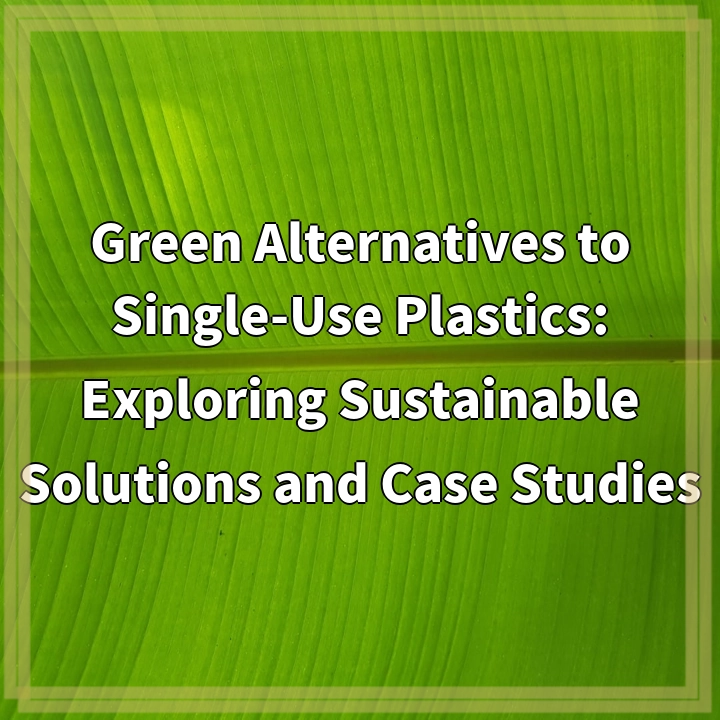Physical Address
304 North Cardinal St.
Dorchester Center, MA 02124
Physical Address
304 North Cardinal St.
Dorchester Center, MA 02124

Single-use plastics, such as plastic bags, straws, and food packaging, have become a significant environmental concern. These products are used once and then discarded, leading to massive waste generation and environmental pollution. Green alternatives to single-use plastics are sustainable alternatives that aim to reduce this environmental impact by providing reusable or compostable alternatives.
The proliferation of single-use plastics poses numerous challenges to our environment. These problems include:
Single-use plastics often end up in our oceans, rivers, and landfills, causing widespread pollution. These materials take hundreds of years to degrade, creating long-lasting harm to ecosystems and wildlife. Marine animals can mistake plastic for food, leading to entanglement or ingestion, resulting in injury or death.
The production of single-use plastics consumes significant amounts of natural resources, including fossil fuels. Extracting and processing these resources contribute to greenhouse gas emissions, exacerbating climate change and resource depletion.
While some plastics can be recycled, the reality is that many regions lack adequate recycling infrastructure. This means that a significant portion of single-use plastics ends up in landfills, incinerators, or natural environments, perpetuating the cycle of pollution.
There is growing concern over the potential health impacts of single-use plastics. Some plastics contain harmful chemicals, such as bisphenols and phthalates, which can leach into food and beverages. These chemicals have been linked to various health issues, including hormonal disruptions and developmental problems.
The economic costs associated with single-use plastics are substantial. Waste management and cleanup efforts place a burden on local municipalities and taxpayers. Furthermore, tourism, fishing, and coastal industries suffer from the negative impacts of plastic pollution, leading to economic losses.
Addressing the problems associated with single-use plastics requires the adoption of sustainable alternatives. Various green alternatives have gained momentum worldwide. These include:
Reusable alternatives aim to replace single-use plastics with durable and long-lasting options. This can include reusable bags, water bottles, food containers, and utensils. By encouraging the use of reusable alternatives, we can significantly reduce plastic waste and resource consumption.
Compostable alternatives are designed to break down naturally into organic matter within specific composting conditions. These alternatives can include food packaging made from plant-based materials or biodegradable polymers. Compostable alternatives offer a more environmentally friendly option for single-use items.
Governments around the world are implementing policies and regulations to tackle the issue of single-use plastics. These measures range from banning specific items to imposing levies or taxes on their use. The implementation of such policies promotes the adoption of green alternatives and encourages businesses and consumers to make more sustainable choices.
Innovative approaches are being developed by businesses and industries to provide green alternatives to single-use plastics. This includes the use of bioplastics, advanced recycling technologies, and sustainable packaging solutions. These innovations aim to reduce the environmental impact of plastic products and contribute to a circular economy.
Solutions to Single-Use Plastics
There are several sustainable solutions to address the problems associated with single-use plastics. These solutions include:
Replacing single-use plastics with reusable alternatives, such as bags, water bottles, food containers, and utensils, reduces plastic waste and resource consumption.
Using compostable alternatives made from plant-based materials or biodegradable polymers helps reduce environmental impact by allowing items to naturally break down into organic matter.
Governments implementing policies and regulations, such as banning specific items or imposing levies on their use, promote the adoption of green alternatives and encourage sustainable choices.
Businesses and industries are developing innovative approaches, such as bioplastics, advanced recycling technologies, and sustainable packaging solutions, to reduce the environmental impact of plastic products and contribute to a circular economy.
Green Alternatives to Single-Use Plastics
By embracing green alternatives to single-use plastics, we can mitigate the environmental harm caused by plastic pollution, conserve natural resources, protect human health, and foster a more sustainable future.
If you’re wondering where the article came from!
#